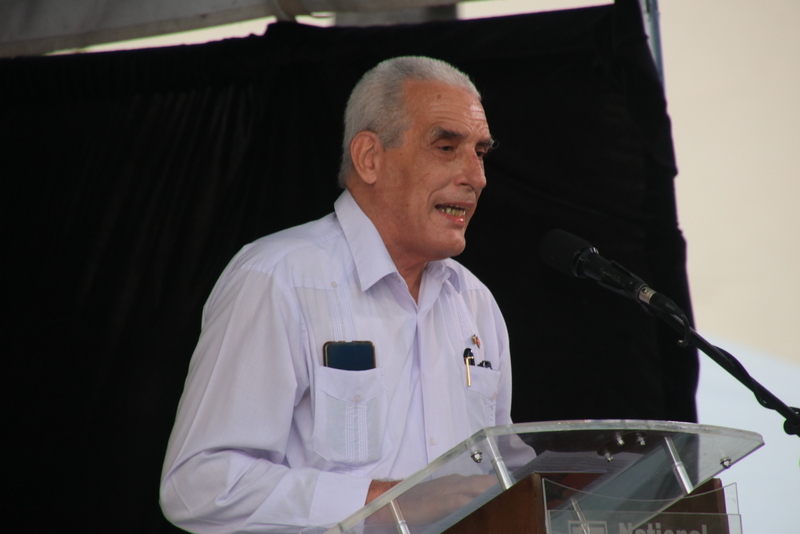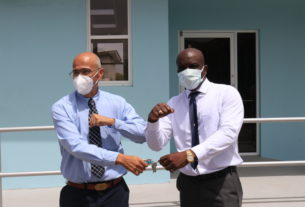Speech by Cuban Ambassador Sergio Jorge Pastrana on the occasion of the
celebration of the Day of National Significance of July 26, 2021 in Barbados.
Protocol being established I would like to thank the organizers for this invitation to share our commemoration with the people of Barbados. The Honorable Prime Minister Mia Amor Mottley, The Honorable Members of Parliament, Ministers, Toni (Moore, Secretary General of the Barbados Workers Union), Bajan and Cuban friends:

celebration of the Day of National Significance of July 26, 2021 in Barbados
The date of the 26 of July, (as it has been said here today), is a milestone for both Barbados and Cuba National Identities. This date marks a Day of National Significance commemorating events that occurred in Barbados in 1937, and in Cuba in 1953.
However, both events are historically linked. Both refer to revolutionary uprisings that took place as a reaction to continued oppression of the labor force of the plantation economy which was born in Barbados in the Seventeenth Century, and came to grow to its mightiest force in Cuba in the early Twentieth Century.
Enormous masses of workers were imported over centuries either by force, deceit, or greed to both countries to provide the workforce which manned the build-up of massive sugarcane, cotton, banana and other stocks plantations. From those workers came the forces that decided once and again to fight oppressors who represented those foreign interests that exploited these lands for their own profit.
As early as 1804, Baron Alexander Von Humboldt wrote ¨The Political Study of the Island of Cuba¨, a scholarly work that studied the slavery based sugar plantation economy to arrive to the conclusion that, apart from the intrinsic horror of slavery, such economies were not sustainable, and were doomed to disappear in the not distant future. The treatise was prohibited in all Spanish America. Soon in 1816 here in Barbados, this was to be proven true by the rebellion led by General Bussa, suffocated with a massacre. But the emancipation from slavery since the1830´s, merely changed the face of exploitation that continued with partly hired salary workers who were used only as needed as cane cutters, and longshoremen within an industry that continued to thrive only to enrich families in the metropolitan countries.
While a hundred years later the third decade of the twentieth century started with an increased value of sugar due to the ravaged European economies as a result of the First World War, and the hiking of the prices of sugar, which provided enrichment to the imperialist powers and local oligarchies, the 1929 crash of the New York Stock Exchange announced the arrival of a crisis that grew all over the world to produce misery and hunger mostly to the classes that provided eventual labor force to
plantation economies.
Thus, all over the wider Caribbean basin, Central America and the northern shores of South America, one after the other there were labor revolts in every country from 1933 to the end of the decade which heralded the birth of the labor movement in these lands.
In Cuba, the institutionalization of the governmental structure did not guarantee the rights that were reflected in a new constitutional effort because government continued to be dominated by the oligarchy until eventually, when elections would have been finally won by the popular forces, Fulgencio Batista produced a Coup d´Etat that guaranteed to the imperialists powers and the mafia, that Cuba will continue to be the
playground and money laundering capital of the Caribbean.
That is when a young law graduate by the name of Fidel Castro took the bell that had heralded in 1868 the emancipation of Cuban slaves together with their masters in the fight for independence, and paraded it in a tour of the whole country. Those young lawyers who accompanied the liberty bell filed a demand before the legal authorities to declare the illegal condition of that government and once dismissed by those authorities, that should have defended them, they decided that their only option left to save the country was to assault the military.
In Cuba, that 26 of July 1953 witnessed how this cohort of youngsters in their twenties stormed the second mightiest military outpost in the country. Many of them lost their lives in that attack, but they provided the spark that fired up a revolution that in merely six years brought about at last the triumph of the oppressed over their former masters.
That revolution lives on to share the destiny of all Caribbean peoples together in developing a sustainable civilization that could bring prosperity to all formerly oppressed populations of the Caribbean against reactionary forces that try to continue the abusive exploitation of these lands and peoples as if they were just providers for their hubris and excesses.
The Cuban Revolution believes in sharing what we have been able to achieve through cooperation in education, health care and sustainable development of our economies.
Ever since Barbados achieved its independence, we continue to build the strong historical relationship of our Bajan and Cuban societies, which was started under the original guidance of Errol Barrow and Fidel Castro and has been continued by the leaders that followed on their path.
Long live the peoples and the labor movements of Barbados and Cuba!




